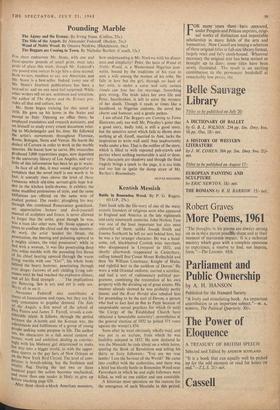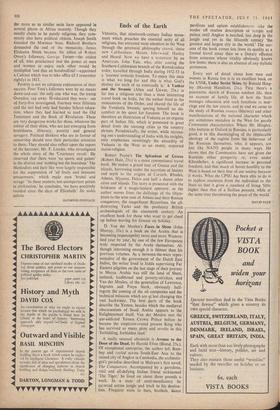Kentish Messiah
Battle in Bossenden Wood. By P. G. Rogers. (0.U.P., 25s.)
THIS book tells the life-story of one of the many ecstatic founders of religious sects who appeared in England and America in the late eighteenth and early nineteenth centuries, John Nichols Tom was one of the least important but also most colourful of them; unlike Joseph Smith and Joanna Southcott he left no sect behind him, but he was a far stranger character. He was a hand- some, tall, blackhaired Cornish wine merchant, who disappeared in Liverpool in 1832, and shortly afterwards reappeared in Canterbury, calling himself first Count Moses Rothschild and then 'Sir William Courtenay, Knight of Malta, and rightful heir to the earldom of Devon.' He wore a wild Oriental uniform, carried a scimitar, and had a sort of rudimentary political pro- gramme, combining the restoration of his own property with the dividing up of great estates. His manner already showed he was probably partly insane, and the Kent Herald also rebuked him for pretending to be the earl of Devon, a person who had in fact had to flee to Paris because of unspeakable sexual practices for which (it said) 'the Clergy of the Established Church have obtained a lamentable notoriety'; nevertheless at the general election of 1832 he polled 375 votes against the winner's 834.
Soon after he went obviously wholly mad, and was put in an asylum, from which he was foolishly released in 1837. He now declared he was the Messiah; he rode about on a white horse, quoting the Book of Revelation and telling his thirty or forty followers: 'You are my true lambs! I am the Saviour of the World!' He came into conflict with the authorities, and there was a brief but bloody battle in Bossenden Wood near Faversham in which he and eight followers were killed, as well as one soldier and one constable.
A historian must speculate on the reasons for the emergence of such Messiahs in this period,
the more so as similar sects have appeared in several places in Africa recently. Though they mostly claim to be purely religious, they com- monly also have political objects. Joseph Smith founded the Mormon State. Richard Brothers demanded the end of the monarchy, James Elishama Smith became the ablest of Robert Owen's followers, Clem ge Turner—the oddest of all, who proclaimed mat the power of men and women to enjoy each other would be multiplied 'and that an hundredfold'—appointed a Cabinet which was to take office (if I remember rightly) in 1817.
Poverty is not an adequate explanation of their success. Poor Tom's followers were by no means down-and-out; the only one who was, the tramp Ovenden, ran away. Ill-educated they were : out of forty-five investigated, fourteen were illiterate and the rest had only had Sunday School educa- tion, where they had learned to read the Old Testament and the Book of !revelation. These are very dangerous works for those, whatever the colour of their skins, who are just emerging from brutishness, illiteracy, poverty and general savagery. Political thinkers who are in favour of censorship should turn their particular attention to them. They should also reflect upon the report of the barrister, Mr. F. Liardet, who investigated the whole story of the 'Courtenay revolt.' He observed that there were `no sports and games' in the district and 'nothing but the beershop.' The Methodists and their like were largely responsible for the suppression of 'all lively and innocent amusements,' which made men 'brutal and savage.' In these matters, not unimportant points in civilisation,' he concludes, 'we have positively receded since the days of Elizabeth.' De nobis fabula.
RAYMOND POSTGATE



















































 Previous page
Previous page